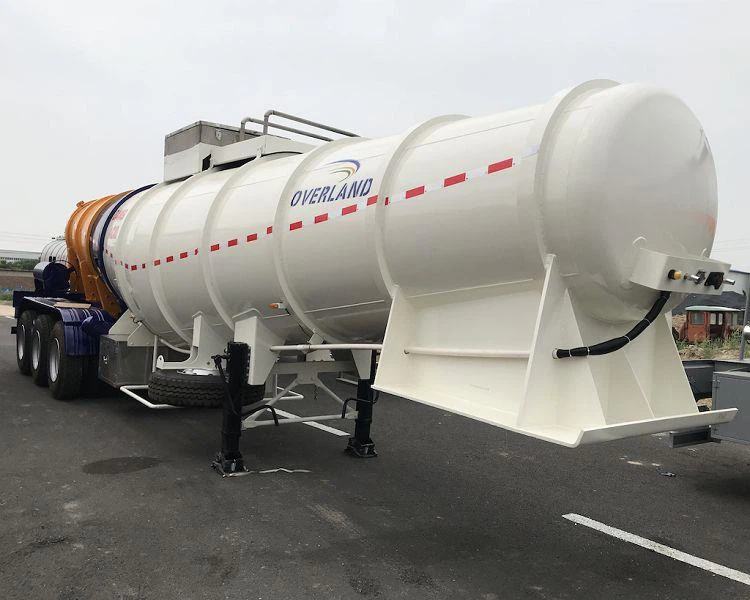Revolutionizing Waste Management: The Rise of Robotic Garbage Trucks

Introduction
The future of waste management appears brighter than ever with the emergence of robotic garbage trucks. These innovative vehicles promise to transform how we handle garbage collection, improve efficiency, reduce costs, and minimize environmental impact. With the growing urban populations and increasing waste generation, city planners and environmentalists alike are seeking sustainable solutions. In this article, we delve into the workings of robotic garbage trucks, their advantages, the technology behind them, and some real-world applications, among other essential aspects. Let’s explore how these autonomous vehicles are reshaping the landscape of waste management.
Understanding Robotic Garbage Trucks
What Are Robotic Garbage Trucks?
Robotic garbage trucks are autonomous vehicles designed to collect waste without human intervention. Equipped with advanced sensors, cameras, and artificial intelligence, these vehicles navigate streets, identify waste bins, and execute collection tasks efficiently. Their ability to operate independently makes them a promising solution for modern waste management challenges.
History of Robotic Garbage Trucks
The concept of autonomous waste collection trucks is relatively new but has rapidly evolved. Early iterations of robotic vehicles can be traced back to experiments in automated systems and drones in waste collection. The first successful trials of fully autonomous trucks began in the early 2020s, where cities began to pilot these vehicles on specific routes.
Benefits of Robotic Garbage Trucks
Increased Efficiency
Robotic garbage trucks can optimize routes and schedule collections based on real-time data. Using algorithms, these trucks can reduce the travel distance and time, resulting in quicker and more efficient pickups.

Cost Reduction
Although the initial investment in robotic trucks is substantial, the long-term cost savings are significant. Reduced labor costs, minimized fuel consumption, and efficient maintenance schedules contribute to lower operational expenditures.
Minimized Human Error
Human error can lead to missed waste collections or accidents. Robotic garbage trucks operate with precision, reducing the chances of mishaps associated with manual collection.
Environmental Benefits
With optimized routes, robotic trucks use less fuel, resulting in lower emissions. Additionally, data-driven operations allow for better recycling and waste sorting, contributing to a greener planet.
The Technology Behind Robotic Garbage Trucks
Autonomous Navigation Systems
Robotic garbage trucks utilize LIDAR, GPS, and computer vision technologies to navigate effectively. These systems work together to map out the truck’s surroundings, allowing it to avoid obstacles and adapt to changes in the environment.
Artificial Intelligence and Machine Learning
AI algorithms process data from various sensors to make real-time decisions. Over time, the trucks can learn the most efficient routes and optimal collection strategies, further enhancing their performance.
Real-World Applications and Examples
Cities Implementing Robotic Garbage Trucks
Several cities worldwide have begun piloting robotic garbage trucks. For example:
- San Francisco: The city has deployed robotic trucks equipped with sensors to map waste collection routes accurately.
- Dubai: Robotic vehicles are being tested for street cleaning and waste collection, contributing to the city’s sustainability goals.
Impact on Waste Management Systems
Robotic garbage trucks have the potential to revolutionize waste management systems by allowing for enhanced data collection regarding waste generation. By analyzing this data, municipalities can refine their waste management strategies effectively.

Case Study: San Francisco
In 2022, San Francisco launched a pilot program featuring robotic garbage trucks that demonstrated a 30% increase in efficiency compared to traditional methods. Residents reported higher satisfaction rates regarding waste collection timeliness and cleanliness in the streets.
Challenges and Limitations
Initial Investment Costs
The primary barrier to adopting robotic garbage trucks is their high initial costs. Cities need to weigh these costs against projected long-term savings and environmental benefits.
Technological Dependence
Robotic garbage trucks heavily rely on technology, which can fail. Issues like software glitches or sensor malfunctions can interrupt service, necessitating a backup plan.
Public Acceptance
Community response to robotic garbage trucks varies. Some residents embrace technological advancements, while others may express concerns about job loss or vehicle safety.
Future Trends in Robotic Waste Collection
Integration with Smart City Initiatives

As more cities transition to smart infrastructures, robotic garbage trucks are likely to become integral components of urban planning, allowing for seamless integration with other smart technologies.
Partnerships with Waste Management Companies
Collaboration between municipalities and private waste management firms will further advance the development and deployment of robotic garbage trucks, ensuring better funding and resource allocation.
Tips for Implementing Robotic Garbage Trucks in Your City
Conduct Thorough Research
Before implementation, it’s crucial to analyze the specific waste management needs of your city and how robotic trucks can address them effectively.
Engage Stakeholders
Involve the community, waste management companies, and city officials in discussions about the potential benefits and drawbacks of introducing robotic trucks.
Start with Pilot Programs
Implementing small-scale pilot programs can provide valuable data and insights before a citywide rollout.
FAQs About Robotic Garbage Trucks
What is a robotic garbage truck?
A robotic garbage truck is an autonomous vehicle designed to collect waste without requiring human intervention, utilizing advanced technology for navigation and operation.
How do robotic garbage trucks navigate?
They use a combination of LIDAR, GPS, and computer vision to map their surroundings, identify obstacles, and optimize collection routes.
What are the benefits of using robotic garbage trucks?
Some benefits include increased efficiency, reduced operational costs, reduced human error, and improved environmental impact.
Are there any challenges associated with robotic garbage trucks?
Yes, challenges include high initial costs, technological dependence, and public acceptance concerns.
How can cities prepare for robotic garbage trucks?
Cities can prepare by conducting research, engaging with stakeholders, and initiating pilot programs to gather insights before full implementation.
What is the future of robotic garbage trucks?
The future likely includes integration with smart city initiatives and collaborations with waste management firms to enhance efficiency and sustainability.
